Examining the Book of Jeremiah 2
Mike Ervin
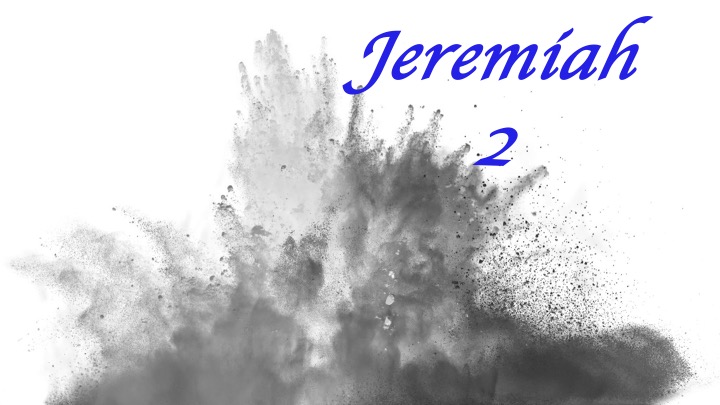
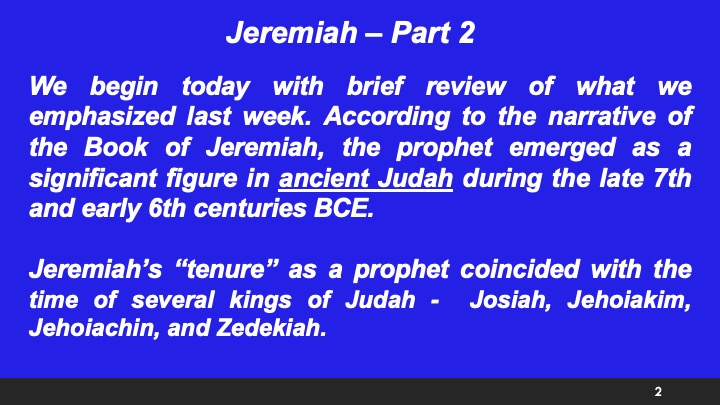
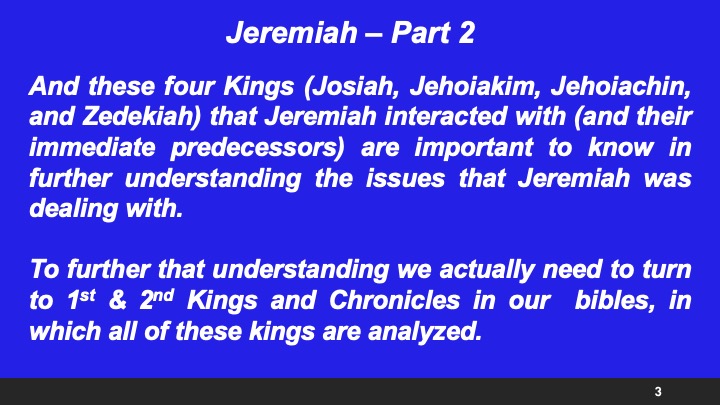
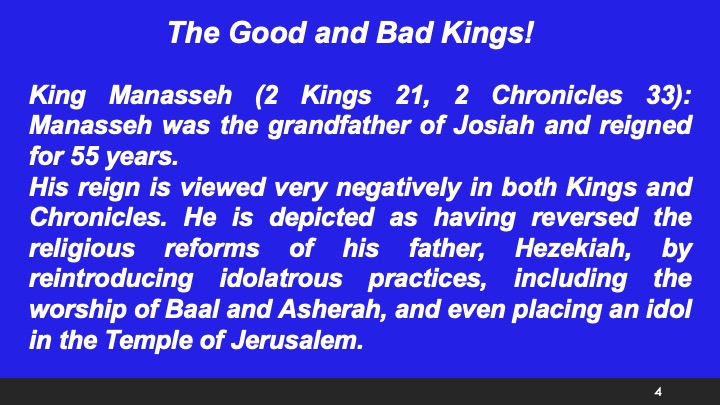
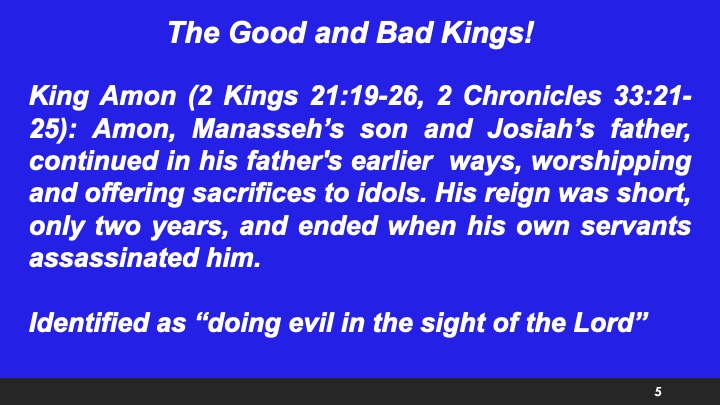
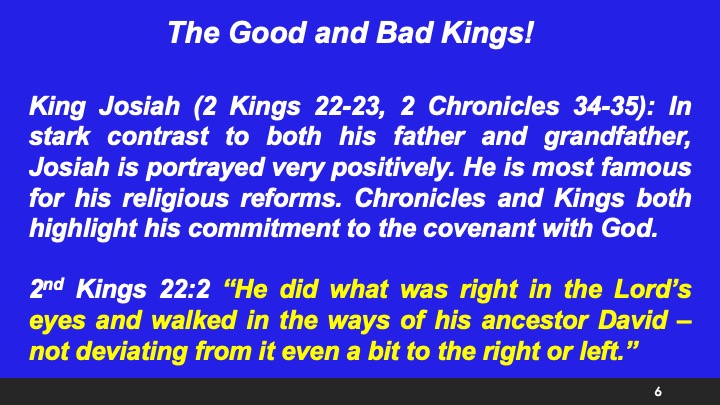
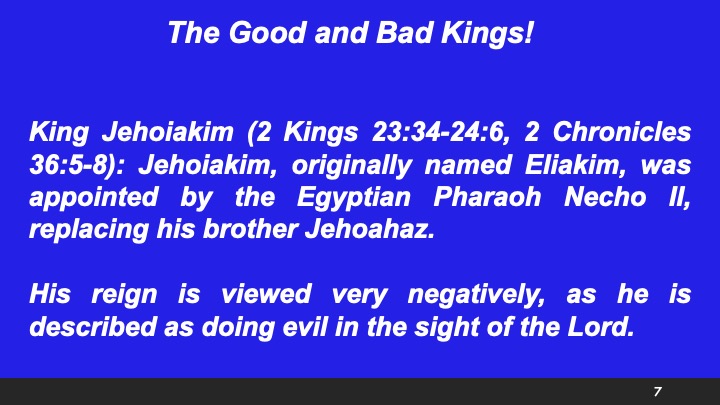
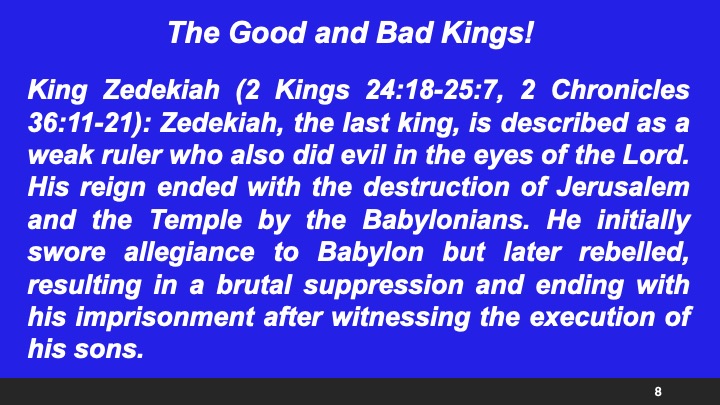
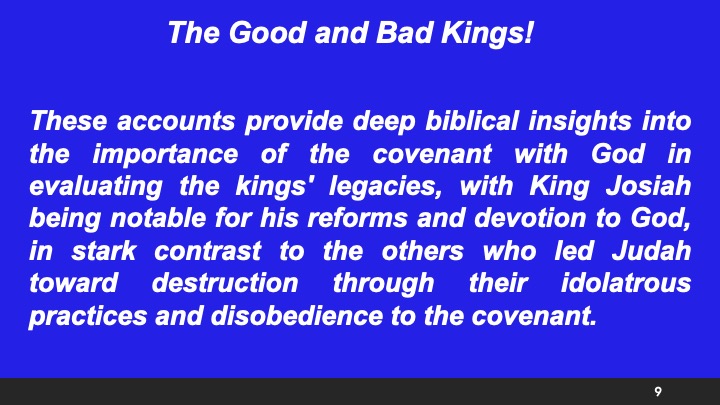
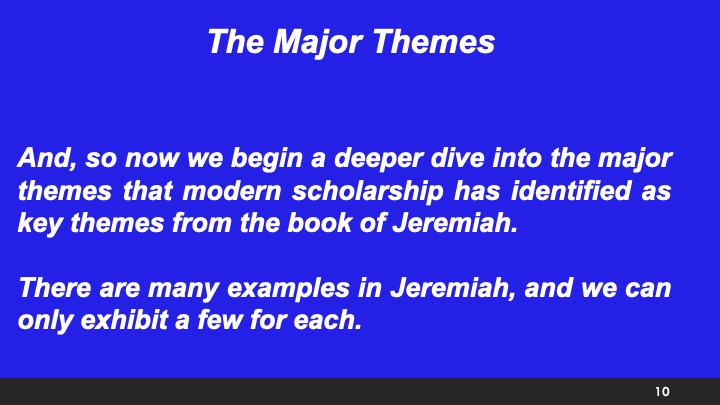
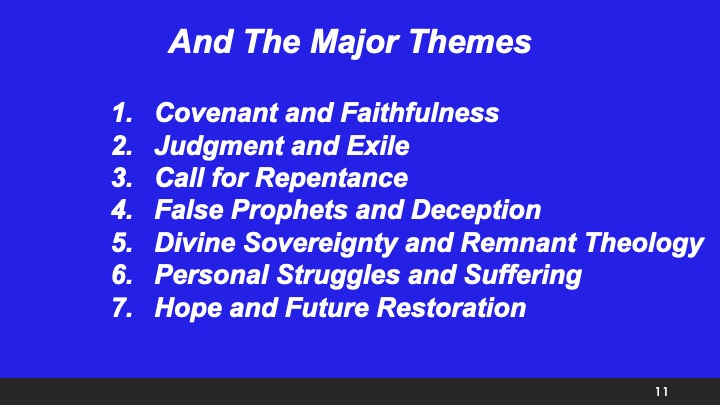
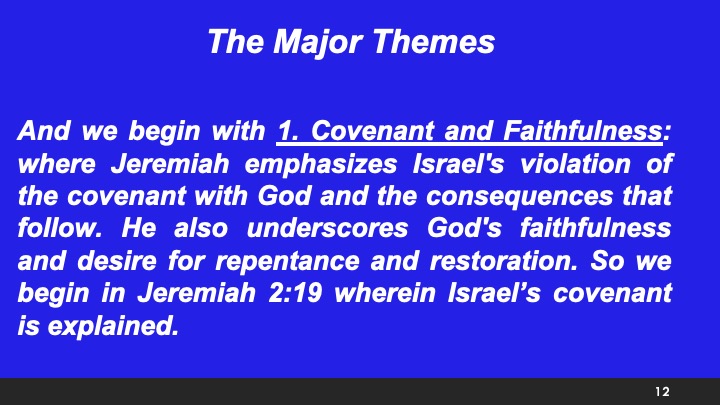
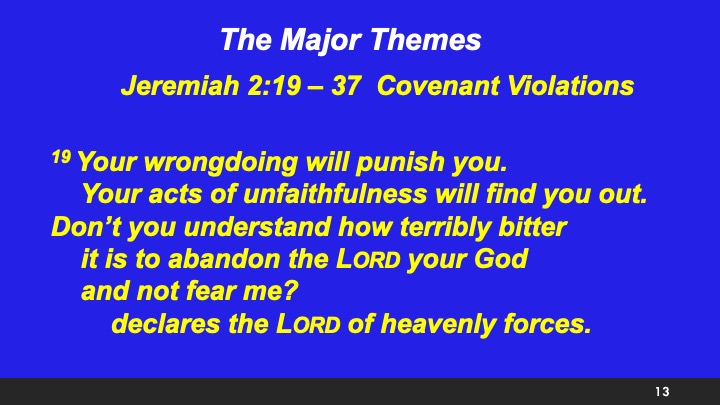
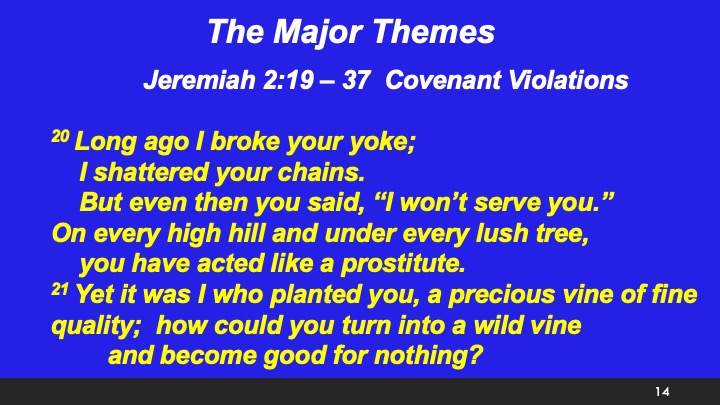
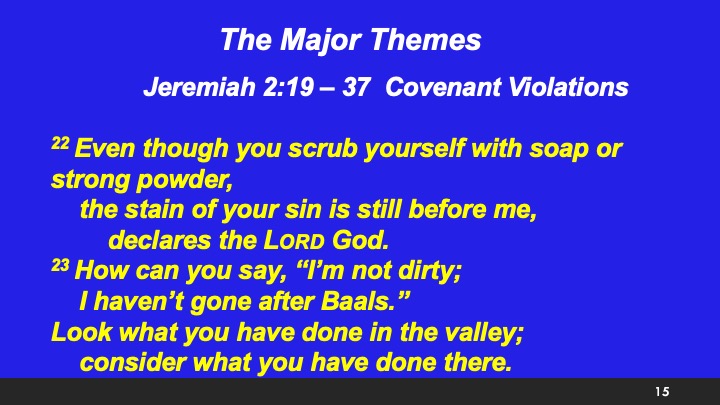
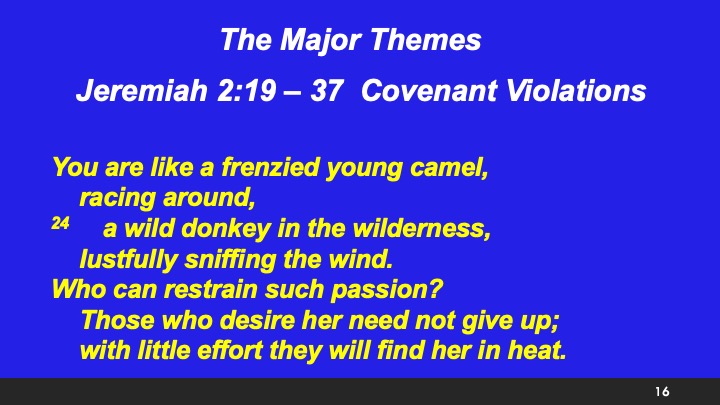
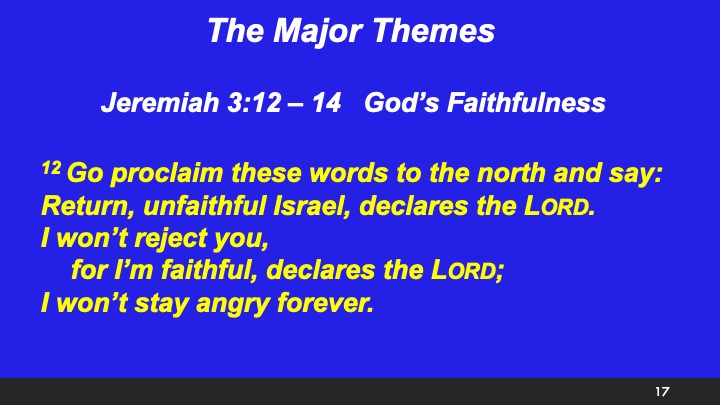
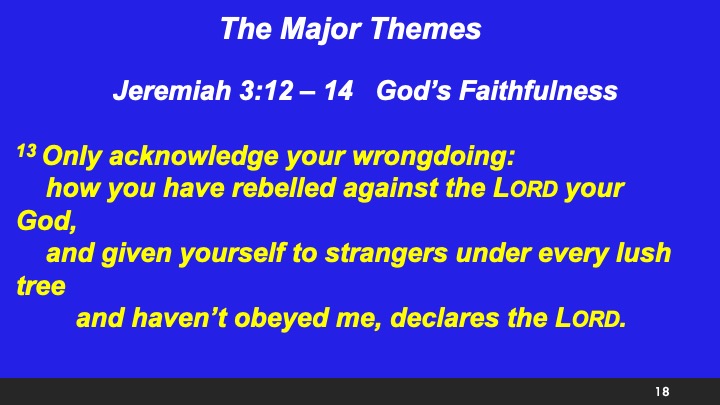
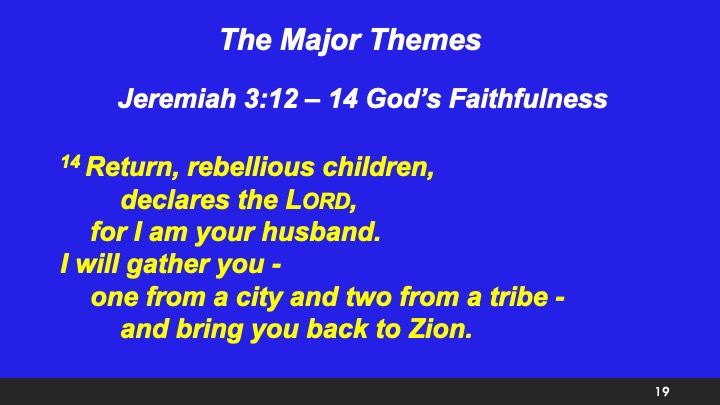
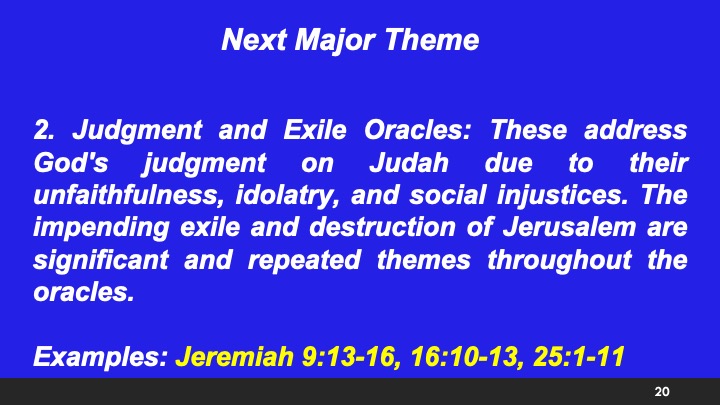
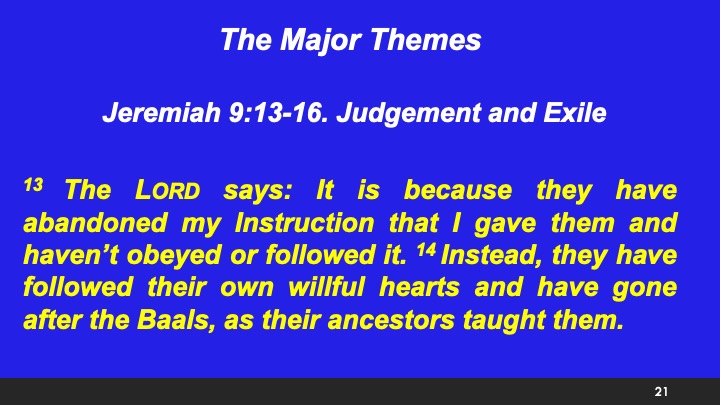
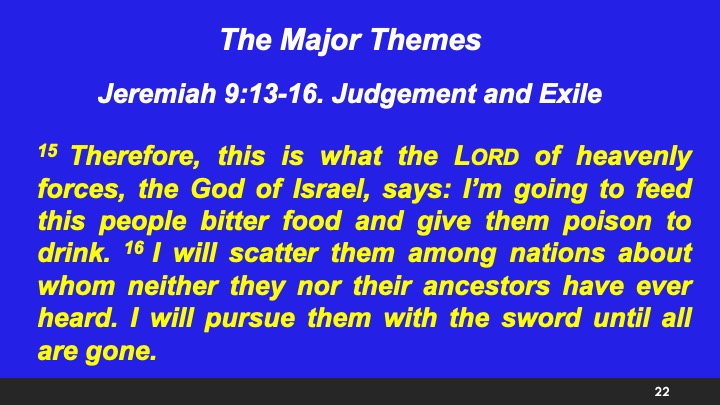
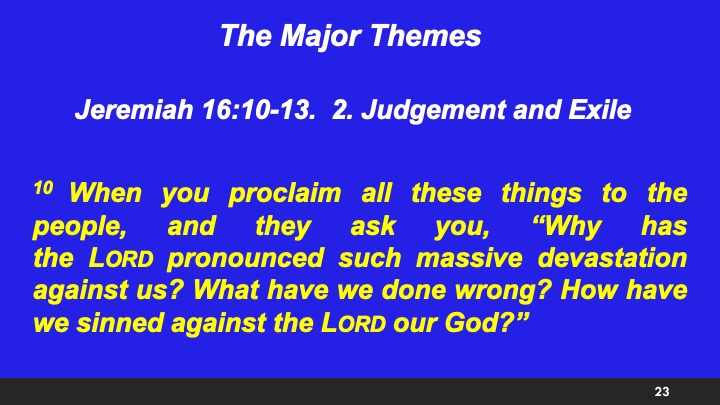
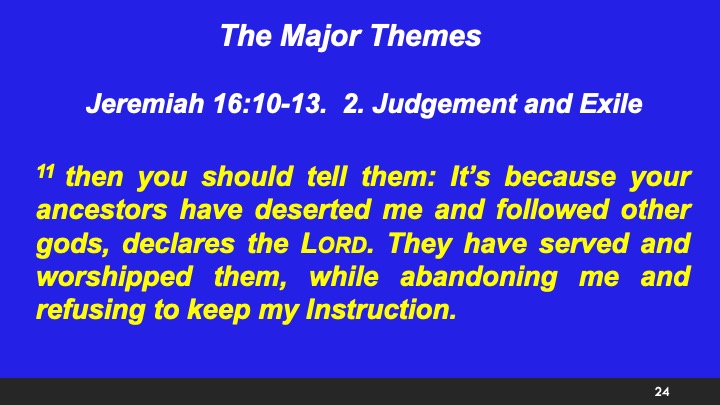
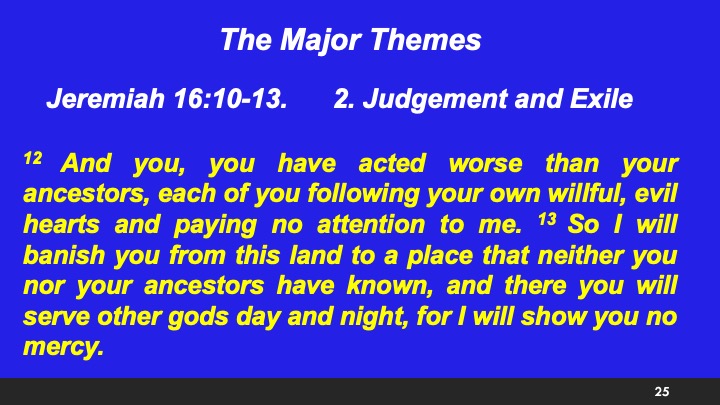
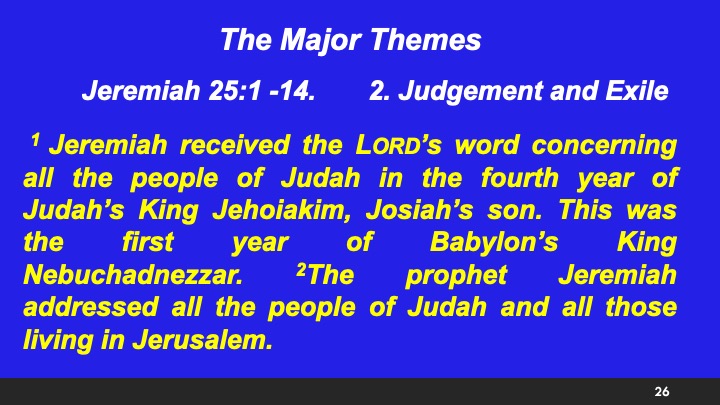
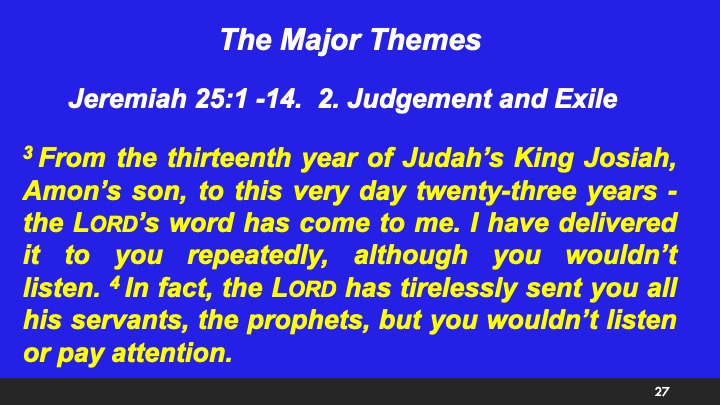
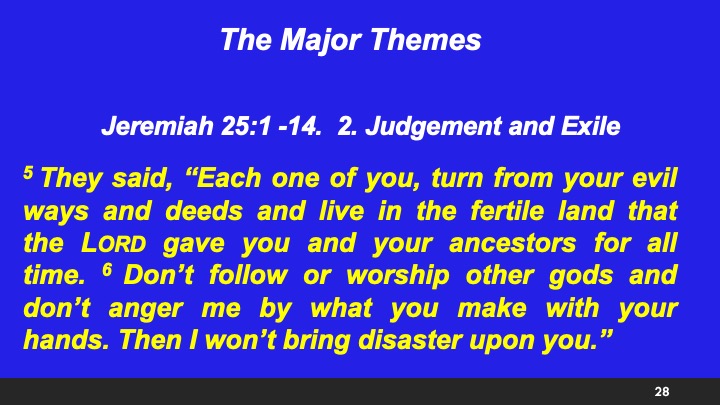
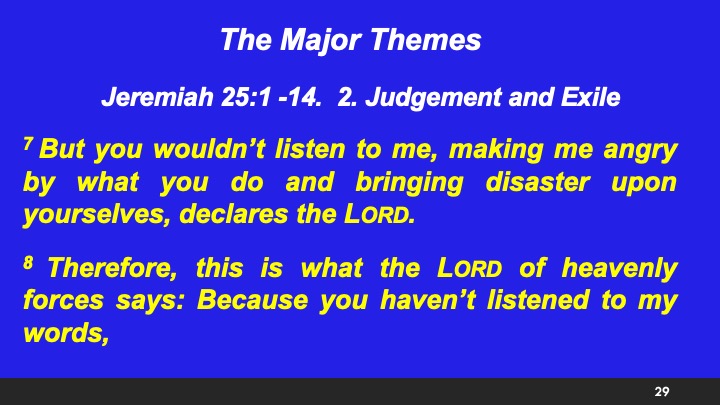
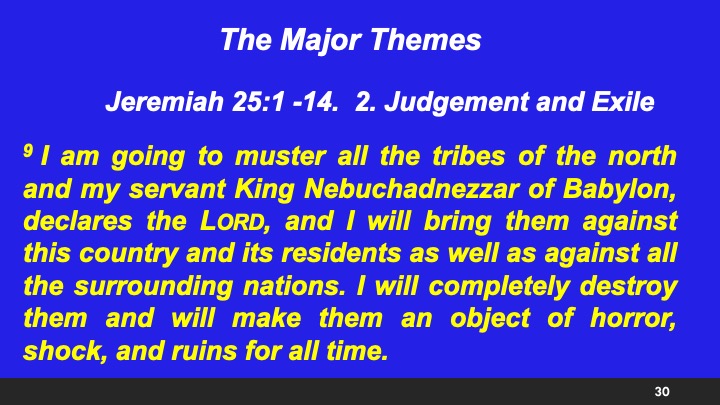
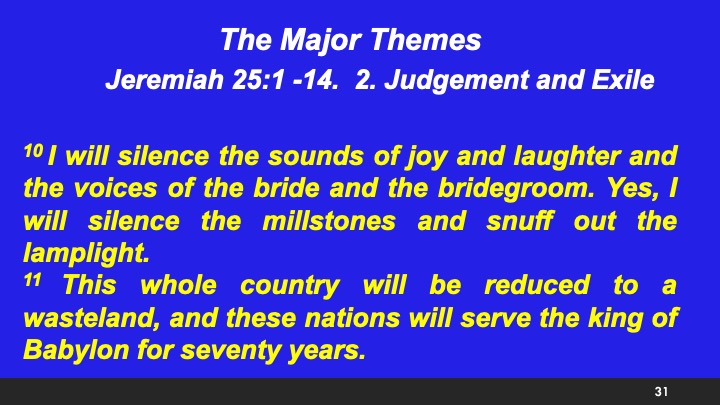
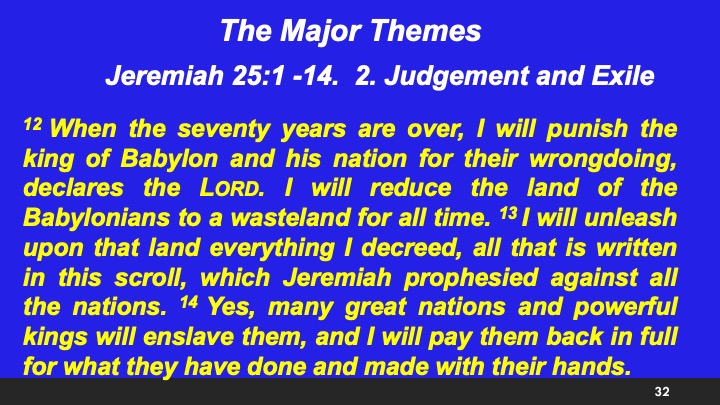
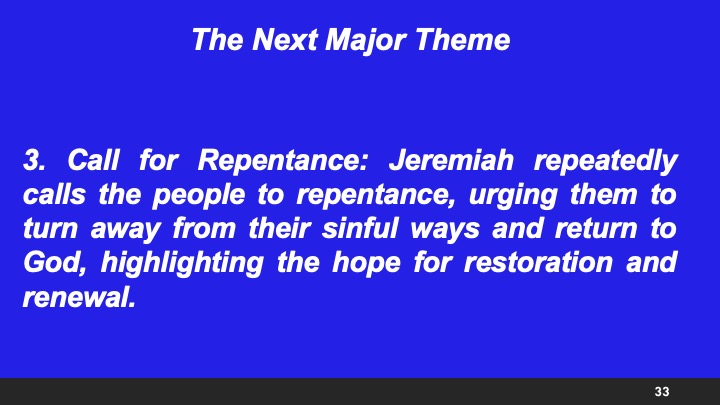
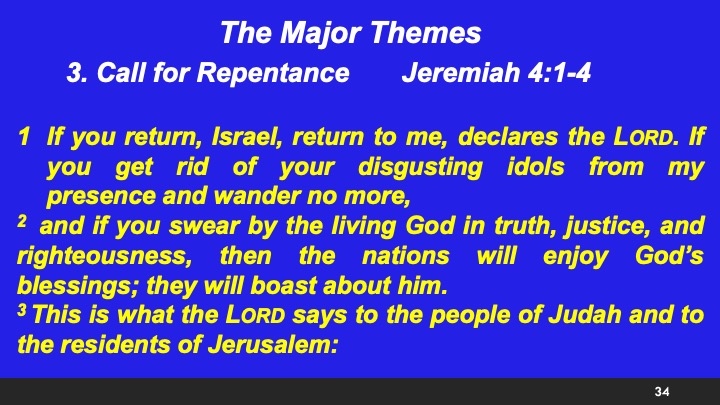
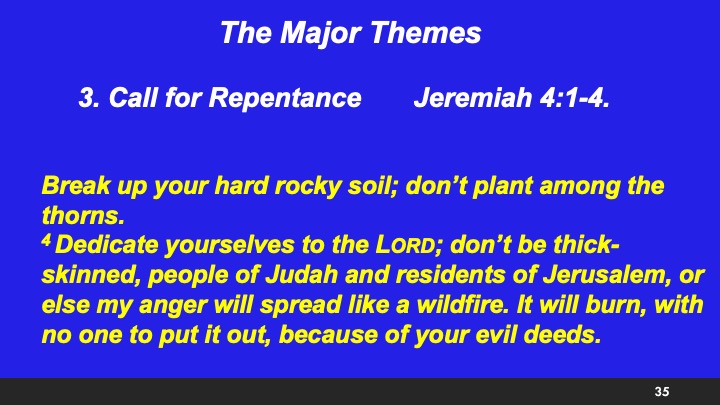
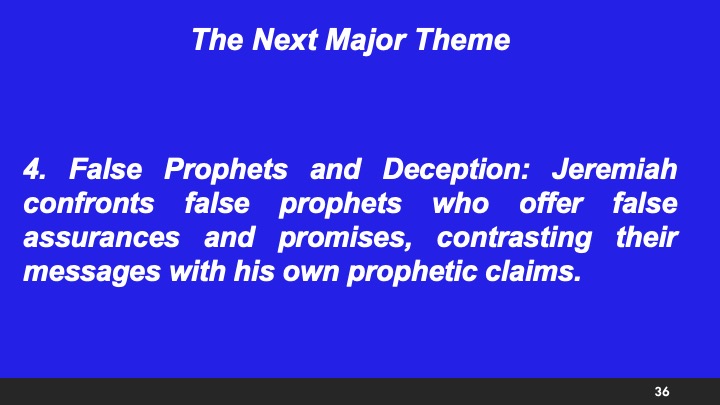
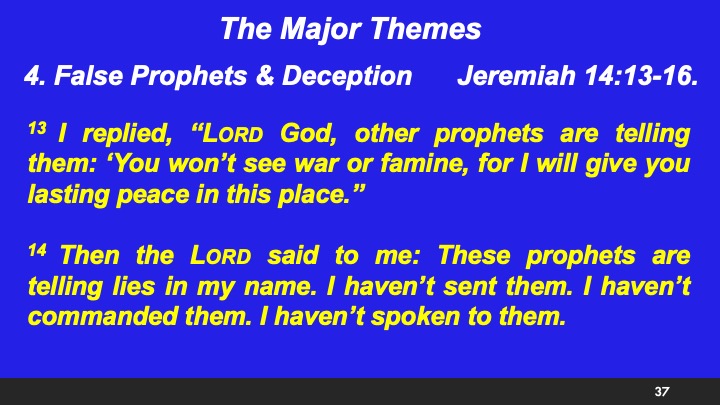
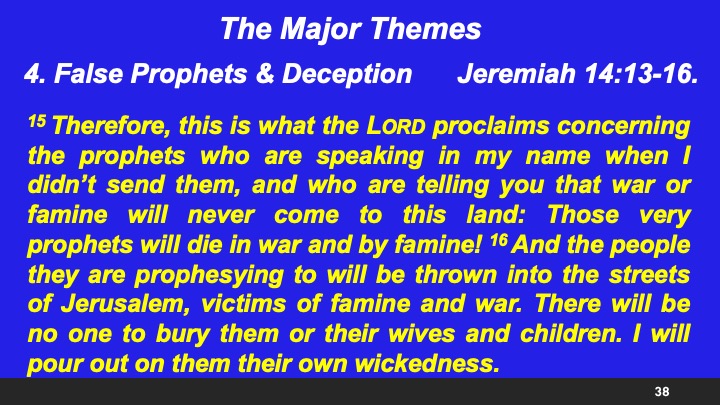
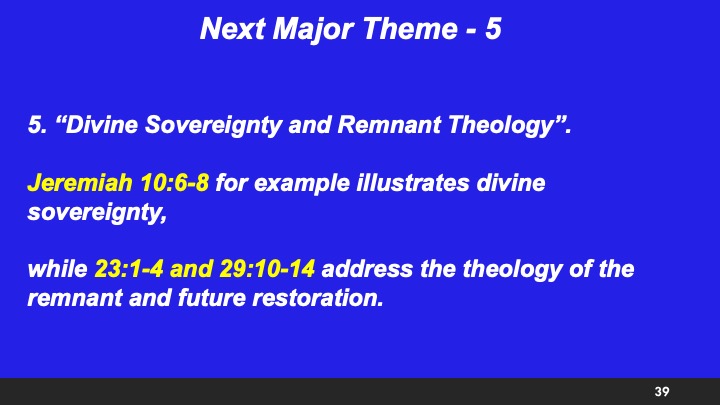
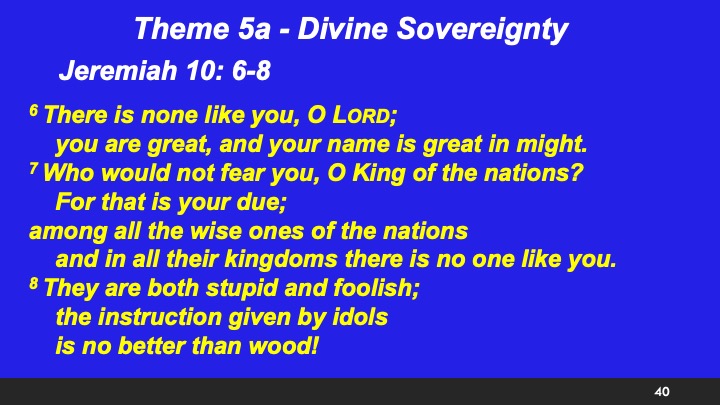
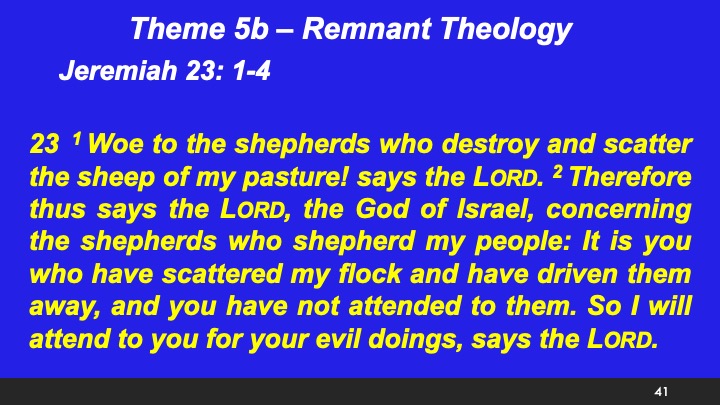
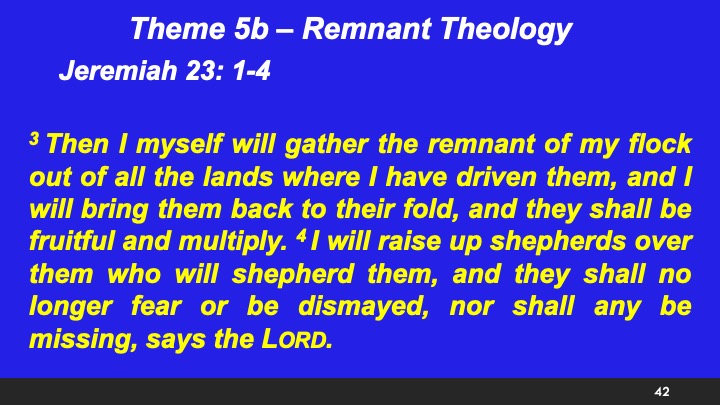
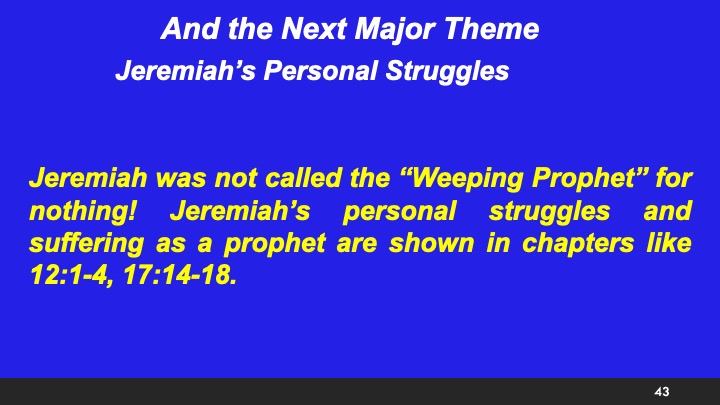
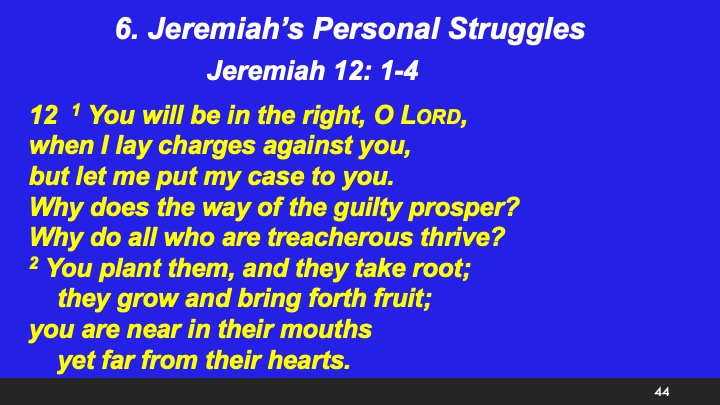
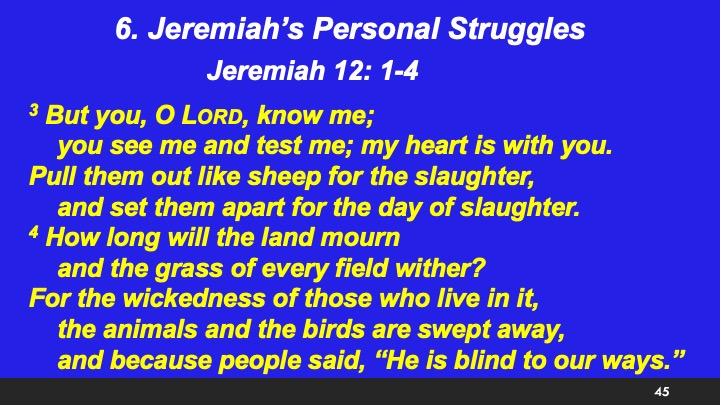
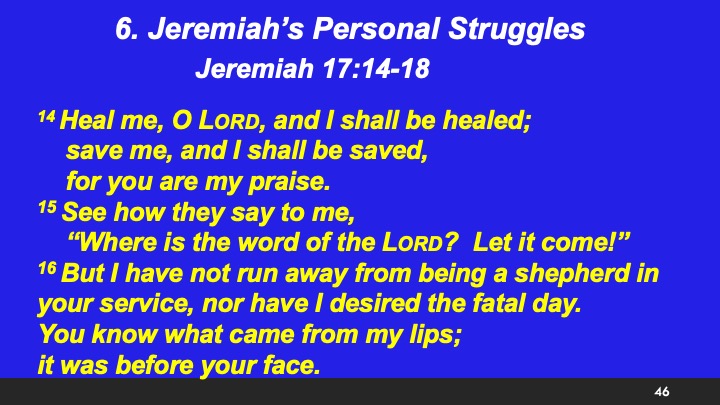
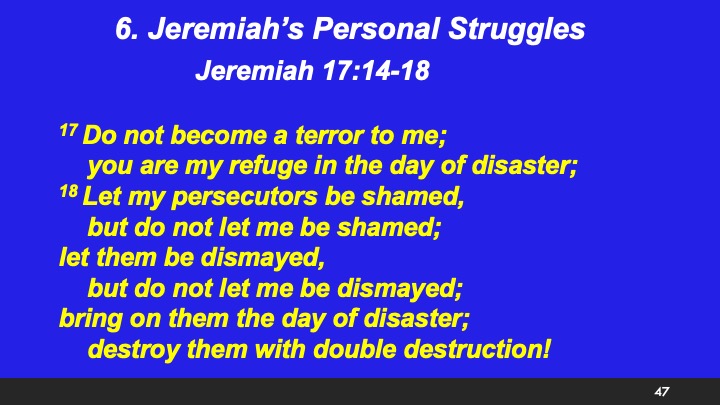
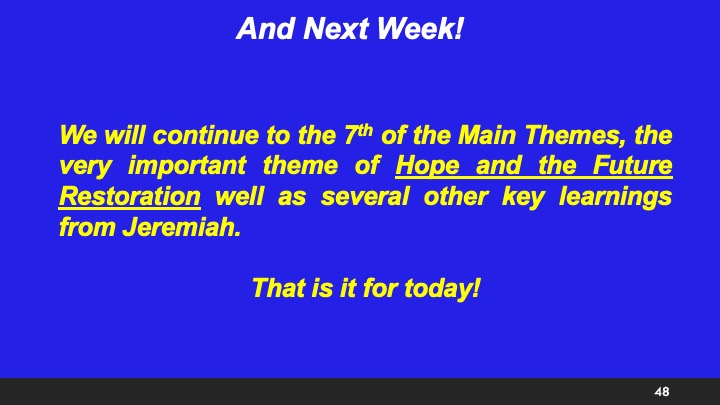

Examining the Book of Jeremiah 2
Links
< Home Page > < Examining Jeremiah Menu > < Top of Page >
Examining the Book of Jeeremiah - 2 Text
Jeremiah – Part 2
We begin today with. brief review of what we emphasized last week. According to the narrative of the Book of Jeremiah, the prophet emerged as a significant figure in ancient during the late 7th and early 6th centuries BCE.
Born into a priestly lineage, Jeremiah reluctantly accepted his call to prophethood, embarking on a over five-decade-long ministry. His life was marked by opposition, imprisonment, and personal struggles.
Jeremiah’s “tenure” as a prophet coincided with the time of several kings of Judah - Josiah, Jehoiakim, Jehoiachin, and Zedekiah.
And these four Kings (Josiah, Jehoiakim, Jehoiachin, and Zedekiah) that Jeremiah interacted with (and their immediate predecessors) are important to know in further understanding the issues that Jeremiah was dealing with.
To further that understanding we actually need to turn to 1st & 2nd Kings and Chronicles in our bibles, in which all of these kings are analyzed.
The Good and Bad Kings!
King Manasseh (2 Kings 21, 2 Chronicles 33): Manasseh was the grandfather of Josiah and reigned for 55 years.
His reign is viewed very negatively in both Kings and Chronicles. He is depicted as having reversed the religious reforms of his father, Hezekiah, by reintroducing idolatrous practices, including the worship of Baal and Asherah, and even placing an idol in the Temple of Jerusalem.
King Amon (2 Kings 21:19-26, 2 Chronicles 33:21-25): Amon, Manasseh’s son and Josiah’s father, continued in his father's earlier ways, worshipping and offering sacrifices to idols. His reign was short, only two years, and ended when his own servants assassinated him.
Identified as “doing evil in the sight of the Lord” – a charge that was used frequently in describing the Kings of Judea in Kings and Chronicles.
King Josiah (2 Kings 22-23, 2 Chronicles 34-35): In stark contrast to both his father and grandfather, Josiah is portrayed very positively. He is most famous for his religious reforms. Chronicles and Kings both highlight his commitment to the covenant with God.
2nd Kings 22:2 “He did what was right in the Lord’s eyes and walked in the ways of his ancestor David – not deviating from it even a bit to the right or left.”
King Jehoiakim (2 Kings 23:34-24:6, 2 Chronicles 36:5-8): Jehoiakim, originally named Eliakim, was appointed by the Egyptian Pharaoh Necho II, replacing his brother Jehoahaz.
His reign is viewed very negatively, as he is described as doing evil in the sight of the Lord.
King Zedekiah (2 Kings 24:18-25:7, 2 Chronicles 36:11-21): Zedekiah, the last king, is described as a weak ruler who also did evil in the eyes of the Lord. His reign ended with the destruction of Jerusalem and the Temple by the Babylonians. He initially swore allegiance to Babylon but later rebelled, resulting in a brutal suppression and ending with his imprisonment after witnessing the execution of his sons.
The Good and Bad Kings!
These accounts provide deep biblical insights into the importance of the covenant with God in evaluating the kings' legacies, with King Josiah being notable for his reforms and devotion to God, in stark contrast to the others who led Judah toward destruction through their idolatrous practices and disobedience to the covenant.
The Major Themes
And we begin with 1. Covenant and Faithfulness: where Jeremiah emphasizes Israel's violation of the covenant with God and the consequences that follow. He also underscores God's faithfulness and desire for repentance and restoration. So we begin in Jeremiah 2:19 wherein Israel’s covenant is explained.
Jeremiah 2:19 – 37 Covenant Violations
19 Your wrongdoing will punish you.
Your acts of unfaithfulness will find you out.
Don’t you understand how terribly bitter
it is to abandon the Lord your God
and not fear me?
declares the Lord of
heavenly forces.
20 Long ago I broke your yoke;
I shattered your chains.
But even then you said, “I won’t serve you.”
On every high hill and under every lush tree,
you have acted like a prostitute.
21 Yet it was I who planted you, a precious vine of fine
quality; how could you turn into a wild vine
and become good for nothing?
22 Even though you scrub yourself with soap
or strong powder,
the stain of your sin is still before me,
declares
the Lord God.
23 How can you say, “I’m not dirty;
I haven’t gone after Baals.”
Look what you have done in the valley;
consider what you have done there.
You are
like a frenzied young camel,
racing around,
24 a wild donkey in the wilderness,
lustfully sniffing the wind.
Who can restrain such passion?
Those who desire her need not give up;
with little effort they will find her in heat.
Jeremiah 3:12 – 14 God’s Faithfulness
12 Go proclaim these words to the north and say:
Return,
unfaithful Israel, declares the Lord.
I won’t reject you,
for I’m faithful, declares the Lord;
I won’t stay angry forever.
13 Only acknowledge your wrongdoing:
how you have rebelled against the Lord your
God,
and given yourself to strangers under every lush tree
and haven’t obeyed me, declares
the Lord.
14 Return, rebellious children,
declares the Lord,
for I am your husband.
I will gather you -
one from a city and two from a tribe -
and bring you back to Zion.
Next Major Theme
2. Judgment and Exile Oracles: These address God's judgment on Judah due to their unfaithfulness, idolatry, and social injustices. The impending exile and destruction of Jerusalem are significant and repeated themes throughout the oracles.
Examples: Jeremiah 9:13-16, 16:10-13, 25:1-11
Jeremiah 9:13-16. Judgement and Exile
13 The Lord says: It is because they have abandoned my Instruction that I gave them and haven’t obeyed or followed it. 14 Instead, they have followed their own willful hearts and have gone after the Baals, as their ancestors taught them.
15 Therefore, this is what the Lord of heavenly forces, the God of Israel, says: I’m going to feed this people bitter food and give them poison to drink. 16 I will scatter them among nations about whom neither they nor their ancestors have ever heard. I will pursue them with the sword until all are gone.
Jeremiah 16:10-13. 2. Judgement and Exile
10 When you proclaim all these things to the people, and they ask you, “Why has the Lord such massive devastation against us? What have we done wrong? How have we sinned against the Lord our God?”
11 then you should tell them: It’s because your ancestors have deserted me and followed other gods, declares the Lord. They have served and worshipped them, while abandoning me and refusing to keep my Instruction.
12 And you, you have acted worse than your ancestors, each of you following your own willful, evil hearts and paying no attention to me. 13 So I will banish you from this land to a place that neither you nor your ancestors have known, and there you will serve other gods day and night, for I will show you no mercy.
Jeremiah 25:1 -14. 2. Judgement and Exile
1 Jeremiah received the Lord’s word concerning all the people of Judah in the fourth year of Judah’s King Jehoiakim, Josiah’s son. This was the first year of Babylon’s King Nebuchadnezzar. 2 The prophet Jeremiah addressed all the people of Judah and all those living in Jerusalem.
3 From the thirteenth year of Judah’s King Josiah, Amon’s son, to this very day twenty-three years - the Lord’s word has come to me. I have delivered it to you repeatedly, although you wouldn’t listen. 4 In fact, the Lord has tirelessly sent you all his servants, the prophets, but you wouldn’t listen or pay attention.
5 They said, “Each one of you, turn from your evil ways and deeds and live in the fertile land that the Lord gave you and your ancestors for all time. 6 Don’t follow or worship other gods and don’t anger me by what you make with your hands. Then I won’t bring disaster upon you.”
5 They said, “Each one of you, turn from your evil ways and deeds and live in the fertile land that the Lord gave you and your ancestors for all time. 6 Don’t follow or worship other gods and don’t anger me by what you make with your hands. Then I won’t bring disaster upon you.”
7 But you wouldn’t listen to me, making me angry by what you do and bringing disaster upon yourselves, declares the Lord.
8 Therefore, this is what the Lord of heavenly forces says: Because you haven’t listened to my words,
9 I am going to muster all the tribes of the north and my servant King Nebuchadnezzar of Babylon, declares the Lord, and I will bring them against this country and its residents as well as against all the surrounding nations. I will completely destroy them and will make them an object of horror, shock, and ruins for all time.
10 I will silence the sounds of joy and laughter and the voices of the bride and the bridegroom. Yes, I will silence the millstones and snuff out the lamplight.
11 This whole country will be reduced to a wasteland, and these nations will serve the king of Babylon for seventy years.
12 When the seventy years are over, I will punish the king of Babylon and his nation for their wrongdoing, declares the Lord. I will reduce the land of the Babylonians to a wasteland for all time. 13 I will unleash upon that land everything I decreed, all that is written in this scroll, which Jeremiah prophesied against all the nations. 14 Yes, many great nations and powerful kings will enslave them, and I will pay them back in full for what they have done and made with their hands.
The Next Major Theme
3. Call for Repentance: Jeremiah repeatedly calls the people to repentance, urging them to turn away from their sinful ways and return to God, highlighting the hope for restoration and renewal.
Jeremiah 3:22. 3. Call for Repentance
3:22 Return, rebellious children,
and I will heal your rebellion.
“Here we
are; we come to you,
for you are the Lord our God.
3. Call for Repentance Jeremiah 4:1-4.
1 If you return, Israel, return to me, declares the Lord. If you get rid of your disgusting idols from my presence and wander no more,
2 and if you swear by the living God in truth, justice, and righteousness, then the nations will enjoy God’s blessings; they will boast about him.
3 This is what the Lord says to the people of Judah and to the residents of Jerusalem:
Break up
your hard rocky soil; don’t plant among the thorns.
4 Dedicate yourselves to the Lord; don’t be
thick-skinned, people of Judah and residents of Jerusalem, or else my anger
will spread like a wildfire. It will burn, with no one to put it
out, because of your evil deeds.
The Next Major Theme
4. False Prophets and Deception: Jeremiah confronts false prophets who offer false assurances and promises, contrasting their messages with his own prophetic claims.
4. False Prophets & Deception Jeremiah 14:13-16.
13 I replied, “Lord God, other prophets are telling them: ‘You won’t see war or famine, for I will give you lasting peace in this place.”
14 Then the Lord said to me: These prophets are telling lies in my name. I haven’t sent them. I haven’t commanded them. I haven’t spoken to them.
4. False Prophets & Deception Jeremiah 14:13-16.
15 Therefore, this is what the Lord proclaims concerning the prophets who are speaking in my name when I didn’t send them, and who are telling you that war or famine will never come to this land: Those very prophets will die in war and by famine! 16 And the people they are prophesying to will be thrown into the streets of Jerusalem, victims of famine and war. There will be no one to bury them or their wives and children. I will pour out on them their own wickedness.
Next Major Theme - 5
5. “Divine Sovereignty and Remnant Theology”.
Jeremiah 10:6-7 and 18:1-10 illustrate divine sovereignty,
while 23:3-4 and 29:10-14 address the theology of the remnant and future restoration.
Theme 5a - Divine Sovereignty
Jeremiah 10: 6-8
6 There is none like you, O Lord;
you are great, and your name is great in might.
7 Who would not fear you, O King of the
nations?
For that is your due;
among all the wise ones of the nations
and in all their kingdoms there is no one like you.
8 They are both stupid and foolish;
the instruction given by idols
is no better than wood!
Theme 5b – Remnant Theology
Jeremiah 23: 1-4
23 1 Woe to the shepherds who destroy and scatter the sheep of my pasture! says the Lord. 2 Therefore thus says the Lord, the God of Israel, concerning the shepherds who shepherd my people: It is you who have scattered my flock and have driven them away, and you have not attended to them. So I will attend to you for your evil doings, says the Lord.
3 Then I myself will gather the remnant of my flock out of all the lands where I have driven them, and I will bring them back to their fold, and they shall be fruitful and multiply. 4 I will raise up shepherds over them who will shepherd them, and they shall no longer fear or be dismayed, nor shall any be missing, says the Lord.
And the Next Major Theme
Jeremiah’s Personal Struggles
Jeremiah was not called the “Weeping Prophet” for nothing! Jeremiah’s personal struggles and suffering as a prophet are shown in chapters like 12:1-4 17:14-18.
6. Jeremiah’s Personal Struggles
Jeremiah 12: 1-4
12 1
You will be in the right, O Lord,
when I lay charges against you,
but let me put my case to you.
Why does the way of the guilty prosper?
Why do all who are treacherous thrive?
2 You plant them, and they take root;
they grow and bring forth fruit;
you are near in their mouths
yet far from their hearts.
3 But you, O Lord, know me;
you see me and test me; my heart is with you.
Pull them out like sheep for the slaughter,
and set them apart for the day of slaughter.
4 How long will the land mourn
and the grass of every field wither?
For the wickedness of those who live in it,
the animals and the birds are swept away,
and because people said, “He is blind to our ways.”
6. Jeremiah’s Personal Struggles
Jeremiah 17:14-18
14 Heal me, O Lord, and I shall be
healed;
save me, and I shall be saved,
for you are my praise.
15 See how they say to me,
“Where is the word of the Lord? Let it come!”
16 But I have not run away from being a shepherd in your
service, nor have I desired the fatal day.
You know what came from my lips;
it was before your face.
17 Do not become a terror to me;
you are my refuge in the day of disaster;
18 Let my persecutors be shamed,
but do not let me be shamed;
let them be dismayed,
but do not let me be dismayed;
bring on them the day of disaster;
destroy them with double destruction!
And Next Week!
We will continue to the 7th of the Main Themes, the very important theme of Hope and the Future Restoration well as several other key learnings from Jeremiah.
That is it for today!
The End